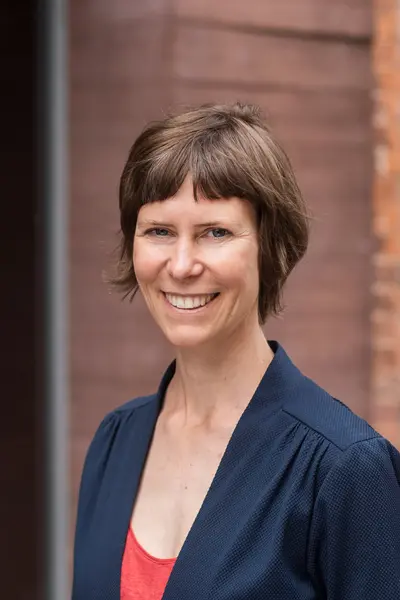Dr. Anke Strauß
Wissenschaftliche Mitarbeiterin/kritische Organisationsforschung/Studiengangsleitung SNM
| Anke.Strauss(at)hnee.de | |
| Telefon | +49 3334 657-566 |
| Ort | Stadtcampus | Schicklerstrasse 5 | 16225 Eberswalde |
| Raum | 01.321 |
| Website | https://www.hnee.de/studium/weiterbildende-studiengaenge/strategisches-nachhaltigkeitsmanagement |
Nachhaltigkeitstransformation, organisationales Lernen, Zukunftsszenarien, Storytellung & Narrative, bedürfnisbasierte Projektentwicklung, künstlerische Ansätze und Methoden
Alternative Organisationen, Nachhaltigkeitstransformation, Writing DIfferently, relationale Ontologien, Affekt & Ästhetik
Link zur Seite mit den externen Veröffentlichungen: Link
Narrating future(s): teaching strategic sustainability management in a relational key, Journal of Applied Learning & Teaching 6(1): 289-295.
A substantial part of sustainability management education is teaching students how to deal with increasingly uncertain futures. Increasingly, academics concerned with sustainability challenges claim that a sustainable way of being with the world needs a transformational shift in how humans relate to one another and the natural world. This paper takes this as a starting point to show the potentials of a relational approach to future scenario planning for developing an ecopedagogy of strategic sustainability management education. For this, it describes a course design that uses narratives to sensitise students to the contingent and composed nature of reality and enable them to take part in negotiating and shaping current and future realities together with others. The paper then highlights the importance of aesthetics for developing transformational capacities. It closes with a reflection on the limits of relational course designs in cultural settings dominated by individuality, nature/culture divide and anthropocentrism.
Performing intimate publics in academic labor: speak-writing as affective politics for sustainable transformation, Culture & Organization, https://www.tandfonline.com/doi/full/10.1080/14759551.2024.2425315?src=exp-la#abstract
Ecological and social systems are in poly-crisis, whose present is mediated not only materially but also affectively. This article introduces the concept of speak-write – a form of writing to be performed for an audience – to address affective states that belong to processes of transformation but are silenced in organisational structures and professional practices, including academia. To contribute meaningfully to a sustainability transformation, this article argues, scholars have to include their conditions of work and what kind of responses they enable or disable. Reflecting on an experience with performing speak-write, this article shows how speak-write can perform an intimate public that might enable finding out what is collective and conventional in the affective atmospheres that circulate and organise our crisis present. Queering academic conventions, speak-write is part of an affective politics in the margins of conventional academic practices that gesture towards how to be home in a world yet-to-come.
Ein Transformationsökosystem für Change Agents: die Bedeutung transformativer Praxisgemeinschaften im Rahmen einer Nachhaltigen Entwicklung, in: W. Leal (ed.) Lehre und Kompetenzen im Bereich Nachhaltigkeit, pp. 245-360. Springer.
Um Change Agents für eine Nachhaltigkeitstransformation auszubilden, benötigt es transformative
Lernsettings, die auf die Entwicklung von Schlüsselkompetenzen ausgerichtet sind. Dieser Beitrag
arbeitet die Bedeutung von Gemeinschaften transformativer Lernpraxis für die Entwicklung von
Schlüsselkompetenzen für eine Nachhaltige Entwicklung heraus. Anhand des an der Hochschule für
Nachhaltige Entwicklung angebotenen Weiterbildungsstudiengangs „Strategisches
Nachhaltigkeitsmanagement“ wird gezeigt, wie sich Praxisgemeinschaften transformativen Lernens
bilden und einen sozialen Kontext bilden, in denen im Austausch mit anderen Schlüsselkompetenzen
erworben, erweitert und gestärkt werden. Zuletzt wird der Begriff des Transformationsökosystems
eingeführt, um ein über den einzelnen Weiterbildungsstudiengang hinausgehendes Milieu zu
beschreiben, das das Potential hat, Nachhaltigkeit gesellschaftlich zu verankern, die darin agierenden
institutionellen Akteure zu transformieren und Change Agents über ihre Zeit als Studierende hinaus zu
stärken.
Teaching what is not there, editorial (with Monika Kostera), Culture and Organization, 28/3-4:186-193, DOI: 0.1080/14759551.2022.2036922
Writing with silent bodies: a pandemic play in three scenes (with Jerzy Kociatkiewicz and Monika Kostera), Culture and Organization, online first, DOI: 10.1080/14759551.2022.2156505